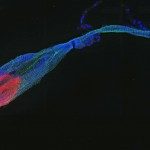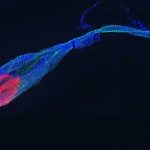Link to Pubmed [PMID] – 22284360
Chem. Biol. 2012 Jan;19(1):131-9
The HIV-1 envelope gp120, which features both the virus receptor (CD4) and coreceptor (CCR5/CXCR4) binding sites, offers multiple sites for therapeutic intervention. However, the latter becomes exposed, thus vulnerable to inhibition, only transiently when the virus has already bound cellular CD4. To pierce this defense mechanism, we engineered a series of heparan sulfate mimicking tridecapeptides and showed that one of them target the gp120 coreceptor binding site with μM affinity. Covalently linked to a CD4-mimetic that binds to gp120 and renders the coreceptor binding domain available to be targeted, the conjugated tridecapeptide now displays nanomolar affinity for its target. Using solubilized coreceptors captured on top of sensorchip we show that it inhibits gp120 binding to both CCR5 and CXCR4 and in peripheral blood mononuclear cells broadly inhibits HIV-1 replication with an IC(50) of 1 nM.

